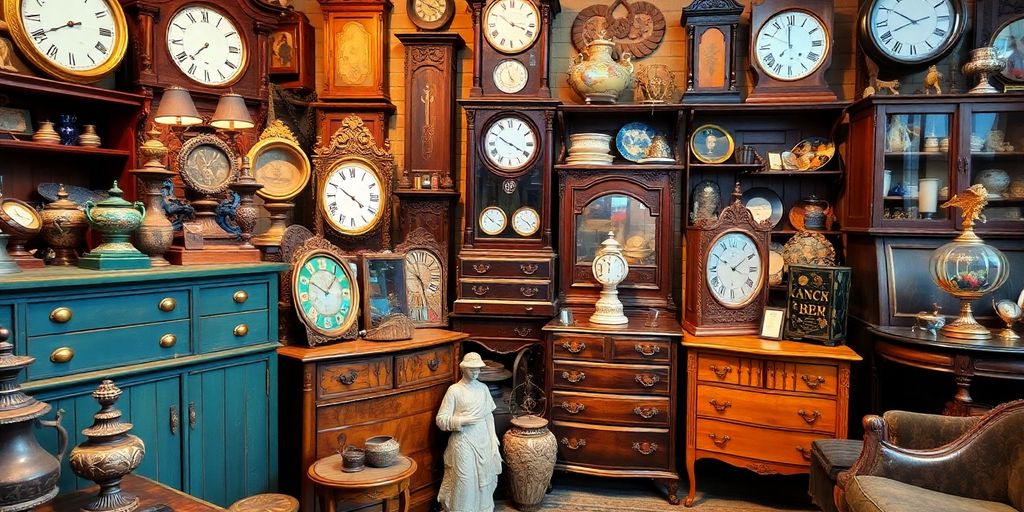Selling antiques can be an exciting adventure, but it can also feel overwhelming. Whether you have a family heirloom or a unique find, knowing where and how to sell your antiques is crucial. This guide will help you discover the best places to sell your antiques, both online and in your local area, ensuring you get the best value for your cherished items.
- Discover the Best Photo Shoot Location Near Me: A Guide to Stunning Backdrops
- Where to Dump Tree Branches Near Me: A Guide to Local Recycling Options
- Discovering Where to Buy Sea Moss Near Me: Your Ultimate Guide to Local Sources
- Discover the Best Restaurants Near Me for an Unforgettable Dining Experience
- Discover the Most Enchanting Couples Places Near Me for Unforgettable Moments
Key Takeaways
- Research your antiques to understand their value before selling.
- Explore local options like antique shops, flea markets, and estate sales.
- Utilize online platforms such as eBay and Etsy for wider exposure.
- Connect with collectors through clubs and online forums to find interested buyers.
- Prepare your antiques for sale by cleaning, documenting, and taking quality photos.
Researching and Valuing Your Antiques
Understanding the value of your antiques is the first step in selling them successfully. Knowing what makes an antique valuable can help you make informed decisions.
You are viewing: Discover Where to Sell Antiques Near Me: A Comprehensive Guide for Antique Enthusiasts
Understanding Antique Value Factors
When assessing the worth of your antiques, consider these key factors:
- Rarity: Unique items are often more valuable.
- Condition: The state of the item, including any damage, plays a big role in its price.
- Historical Importance: Items linked to significant events or figures can fetch higher prices.
- Market Demand: Stay updated on current trends to understand what buyers are looking for.
Consulting Professional Appraisers
If you’re unsure about your antique’s value, consulting a professional appraiser can be beneficial. They can provide a detailed report on:
- Authenticity
- Rarity
- Market value
Using Online Valuation Tools
There are various online resources to help you gauge your antiques’ worth. Here are some steps to follow:
- Search for similar items on online marketplaces.
- Use valuation websites that specialize in antiques.
- Join online forums to discuss with other antique enthusiasts.
Researching your antiques thoroughly can help you spot valuable antiques and avoid costly mistakes. Take the time to understand periods, age, and other important factors before making a sale.
By understanding these aspects, you can confidently navigate the selling process and maximize your profits.
Exploring Local Selling Options
When it comes to selling antiques, local options can be very rewarding. Here are some great ways to connect with buyers in your area:
Visiting Antique Shops and Dealers
Antique shops and dealers are excellent places to sell your items. They often have a loyal customer base and can help you price your antiques effectively. Here are some points to consider:
- Established Audience: Many shops have regular customers who are always on the lookout for unique pieces.
- Expert Assistance: Staff members usually have knowledge about antiques and can guide you in pricing.
- Commission Fees: Be aware that some shops may take a commission on sales.
Participating in Flea Markets and Vintage Fairs
Flea markets and vintage fairs provide a lively atmosphere to sell your antiques. Here’s why you might want to participate:
- Direct Interaction: You can meet buyers face-to-face and negotiate prices.
- Diverse Audience: These events attract a wide range of people, including collectors and casual shoppers.
- Showcase Variety: You can display multiple items, increasing your chances of making sales.
Attending Estate Sales and Liquidation Sales
Estate sales can be a fantastic way to sell antiques, as they often involve selling entire collections. Here are some benefits:
- Serious Buyers: Estate sales attract collectors and dealers looking for unique items.
- Professional Help: Many estate sale companies handle the logistics, making the process easier for you.
- Wide Range of Items: You can showcase various antiques, appealing to different buyers.
Remember, selling locally can help you build connections in the antique community, which may lead to future sales opportunities.
Read More : Discover the Best Photoshoot Places Near Me: A Guide to Stunning Locations
By exploring these local selling options, you can find the best fit for your antiques and maximize your chances of success!
Utilizing Online Marketplaces
In today’s digital age, selling antiques online has become easier than ever. Online marketplaces provide a fantastic way to reach a wide audience and connect with potential buyers. Here are some popular platforms to consider:
Selling on eBay and Etsy
- eBay: This platform is one of the largest online marketplaces. You can choose between auction-style listings or fixed prices. Make sure to provide detailed descriptions and multiple photos to attract buyers.
- Etsy: Known for handmade and vintage items, Etsy is a great place to sell antiques. Create a shop and use relevant keywords to reach your target audience.
Listing on Specialized Antique Websites
- Ruby Lane: This site focuses on antiques and collectibles, making it a great option for sellers.
- 1stdibs: A high-end marketplace for luxury antiques, ideal for unique and valuable items.
Maximizing Listings with High-Quality Photos
- Use natural light to capture the true colors of your antiques.
- Take multiple angles to show details and any imperfections.
- Consider using a plain background to make your items stand out.
Selling antiques online opens up a world of opportunities. By choosing the right platform and presenting your items well, you can connect with collectors and enthusiasts from around the globe.
By utilizing these online marketplaces, you can effectively reach a larger audience and increase your chances of selling your antiques successfully. Remember to research each platform to find the best fit for your items!
Connecting with Collectors and Enthusiasts
Connecting with fellow antique lovers can be a great way to sell your items and learn more about the market. Joining local groups can open doors to new opportunities. Here are some ways to engage with collectors and enthusiasts:
Joining Local Antique Clubs
- Look for clubs in your area that focus on antiques.
- Attend meetings to meet other collectors and share knowledge.
- Participate in club events to showcase your items.
Networking at Antique Shows and Exhibitions
- Attend local antique shows to meet potential buyers.
- Bring your antiques to display and talk to other collectors.
- Exchange contact information for future sales opportunities.
Engaging in Online Antique Forums
- Join online forums where antique lovers gather.
- Share your experiences and ask for advice on selling.
- Post about your antiques to attract interested buyers.
Connecting with others who share your passion can lead to valuable insights and potential sales. Don’t hesitate to reach out and build relationships in the antique community!
Preparing Your Antiques for Sale
When you’re ready to sell your antiques, it’s important to prepare them properly. Taking the time to get your items ready can make a big difference in how quickly they sell and for how much. Here are some steps to follow:
Cleaning and Repairing Items
- Clean your antiques gently to avoid damage. Use appropriate cleaning methods based on the material and age of the item.
- If there are any repairs needed, consider consulting a professional to ensure the work is done correctly.
- Make sure everything is in good condition before you list it for sale.
Documenting Provenance and History
- Gather any documents that prove the history of your antiques, like certificates of authenticity or appraisals.
- Write down interesting facts about the item, such as its age, maker, and any unique features.
- This information can help potential buyers feel more confident in their purchase.
Taking High-Quality Photographs
- Capture clear, well-lit photos of your items from different angles. This helps buyers see the details.
- Use a neutral background to keep the focus on the antique itself.
- Avoid heavy editing; you want the photos to accurately represent the item.
Preparing your antiques well can lead to better sales. Remember, don’t spread yourself too thin—focus on showcasing the best aspects of each piece!
Considering Auction Houses
Understanding Auction House Fees
When selling antiques through auction houses, it’s important to be aware of the fees involved. These can include:
- Listing fees: A charge for putting your item up for auction.
- Commission fees: A percentage taken from the final sale price.
- Additional costs: Fees for photography, marketing, or storage.
Understanding these costs can help you decide if auctioning is the right choice for you.
Preparing Items for Auction
To ensure your antiques attract the right buyers, consider these steps:
- Research the auction house: Make sure it specializes in antiques and has a good reputation.
- Clean and repair: Make your items look their best before the auction.
- Document provenance: Provide any history or background information about your items.
Read More : Who Buys Old Coins Near Me? Discover Local Coin Dealers and Shops
Taking these steps can increase your chances of a successful sale.
Maximizing Auction Success
To get the best results from your auction, keep these tips in mind:
- Set a realistic reserve price: This is the minimum amount you’re willing to accept.
- Promote your items: Use social media or local networks to generate interest.
- Engage with potential buyers: Answer questions and provide additional information to build trust.
Remember: Discover essential tips and key factors before selling at an antique auction, from valuation to choosing the right auction house for your items.
By following these guidelines, you can navigate the auction process more effectively and potentially achieve better sales for your antiques.
Leveraging Social Media Platforms
Social media is a powerful tool for selling antiques. It allows sellers to reach a larger audience and showcase their unique items effectively. Using social media marketing for antique auctions can significantly boost your sales. Here are some popular platforms to consider:
Selling on Facebook and Instagram
- Facebook Marketplace: A great place to list your antiques locally or even in nearby areas. You can use search filters to help buyers find your items easily.
- Instagram: This platform is perfect for sharing high-quality photos of your antiques. Create a dedicated account to attract antique lovers.
- Engagement: Interact with your audience by responding to comments and messages. This builds trust and encourages sales.
Using TikTok for Antique Sales
- Creative Videos: TikTok allows you to create short videos showcasing your antiques. Highlight their unique features and share interesting stories.
- Live Streaming: Engage directly with viewers through live streams. This can help you demonstrate your items and answer questions in real-time.
- Direct Links: Include links in your bio to guide interested buyers to your selling platforms.
Tips for Success
- High-Quality Photos: Always use clear and attractive images of your antiques.
- Engaging Content: Share stories or fun facts about your items to capture interest.
- Regular Updates: Keep your audience engaged by posting regularly and updating them on new items.
Social media can transform how you sell antiques, making it easier to connect with buyers and showcase your unique pieces.
Final Thoughts on Selling Antiques
In conclusion, selling antiques can be a rewarding experience if you know where to look. Whether you choose to sell online through platforms like eBay and Etsy or prefer local options like antique shops and flea markets, there are plenty of avenues to explore. Take the time to research your items and understand their value, as this will help you get the best price. Remember, the right buyer is out there, and with a little effort, you can turn your antiques into cash. Happy selling!
Frequently Asked Questions
How can I find out the value of my antiques?
To find out what your antiques are worth, you can look for similar items online, talk to antique dealers, or hire a professional appraiser. They can help you understand how much your items might sell for.
Where is the best place to sell my antiques?
The best place to sell your antiques depends on what you have. You can try online sites like eBay or Etsy, or local options like antique shops, flea markets, and auction houses.
What should I do to prepare my antiques for sale?
Make sure your antiques are clean and in good shape. Take clear photos that show off their details. It’s also helpful to gather any history or paperwork related to the items.
Can I sell antiques online?
Yes, you can sell antiques online through websites like eBay, Etsy, and specialized antique sites. Just make sure to provide good descriptions and photos.
What are auction houses, and how do they work?
Auction houses are places where you can sell antiques to the highest bidder. You give them your items, and they handle the sale, but they usually take a fee from the final price.
How can I connect with other antique lovers?
You can join local antique clubs, participate in antique shows, or engage in online forums. These are great ways to meet other collectors and find potential buyers.
Soure: https://herego.net
Category: near me


